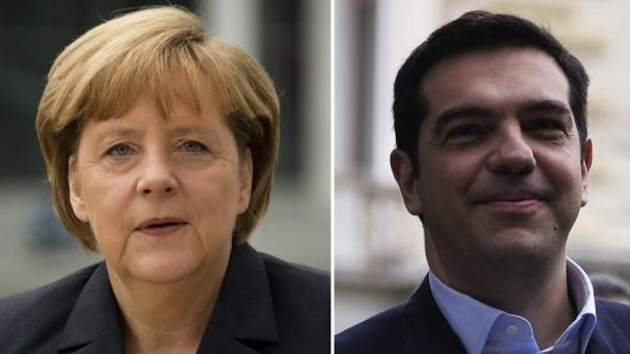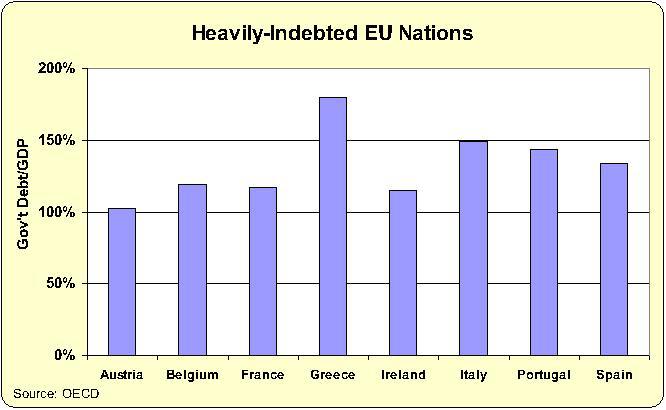

German chancellor Angela Merkel (left) and Greece’s new prime minister Alexis Tsipras right. Mrs Merkel has repeatedly stated Athens must respect the bailout accord with the EU. (Photo: AFP)
European finance officials in Brussels are meeting for the third time in 10 days on Friday in an attempt to salvage Greece’s financial and economic future. Officials say a deal between the European Union (EU) and Greece appears to be close, but Germany is not totally satisfied and indicated there’s some distance between the two remaining.
Euro zone leaders, particularly Germany, say Greece must meet its prior obligations, which amounts to a $272 billion bailout the entitlement-ridden, low employment participation nation needed to save itself from complete financial collapse. However, newly elected Prime Minister Alexis Tspiras and his radical leftist Syriza Party say the EU must agree to easing the austerity imposed on Greece as a result of the agreement.
Last month, Tspiras and the Syriza Party came to power in an election that many saw to be the Greek people’s refusal to take responsibility for their actions. The nation has long-coddled an entitlement mentality that is, and never was, a feasible policy commitment.
German officials have not yet decided whether to grant Athens’ request for a six-month extension on its $272 billion bailout from the European Union, European Central Bank, and International Monetary Fund, which expires at the end of the month.
While Finance Minister Wolfgang Schaeuble rejected the idea of an extension outright on Thursday, Chancellor Angela Merkel’s office said on Friday that Greece’s proposal could help extend talks. Greek officials insist that they have done their part.
“We have covered four fifths of the distance, they also need to cover one fifth,” one official said.
But the truth of the matter is that — while Germany has always essentially carrying the EU — they now know that they are, are beginning to openly say so in public, and have very different views about a Greek exit than they did just one year ago.
“Many of us in Berlin and Brussels no longer subscribe to the chain theory,” one German finance official told PPD Business. Speaking on the condition of anonymity, the officials said they are more willing than ever to put the untested theories of the intelligentsia to the test.
“It may in fact be a better option if the weakest link were to be eliminated, and the lesson is learned.”
On Thursday, Merkel met with Tsipras for an hour in an attempt to reach a breakthrough. Tsipras “feel[s] certain that the Greek letter for a six-month extension of the loan agreement with the conditionalities that accompany it will be accepted,” a statement provided to Reuters read.
“What happens to Greece will have a big impact on the behavior of other European governments that also are drifting toward bankruptcy,” according to CATO Institute’s Daniel J. Mitchell. Because of bad demographics and poor decisions by their politicians, every one of these nations is likely to endure a Greek-style fiscal crisis in the near future.”
Mitchell, a PPD contributor, recently wrote of the implications of the EU-Greek battle. The extent to which the EU nations are in dire financial trouble underscores why Germany is taking the hard-line approach.
Meanwhile, if Greece does not receive an infusion of cash before the bailout expires, it very well likely could run out of money by the end of March. Many EU officials believe such a development would hasten a Greek exit from the euro zone, and cite the fact many Greeks are pulling their money from banks, totaling over 1 billion euros over the past two days.
Regardless of whether the theories that long-enabled EU entitlement behavior to continue are accurate, it would seem more likely than ever that the fate of Greece and the euro zone will be decided in Brussels.




